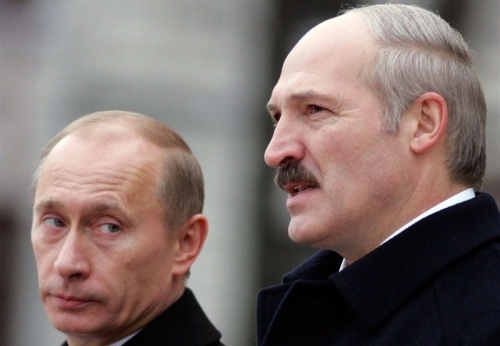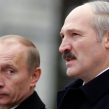
Belarus: Between a Rock and a Hard Place
Publication: Eurasia Daily Monitor Volume: 11 Issue: 208
By:

Three inter-related themes engage attention in the Belarusian and international media: the ambivalent image of Belarus, its upcoming presidential elections, and the Belarusian economy. The economy appears to be the linchpin of this triad. It informs Belarus’s image, if only to some extent. But although the Belarusian authorities are currently doing their best to facilitate good news about the economy on the eve of the presidential elections, ensuring a strong economy in the near future will likely be increasingly difficult.
Oftentimes, whenever there is a discrepancy between a well-worn cliché and the facts, many in the general public are inclined to cling to the former, but lately Belarus has been breaking through some of these clichés. The recently published book by Margarita Balmaceda, Living the High Life in Minsk: Russian Energy Rents, Domestic Populism, and Belarus’ Impending Crisis (CEU Press, 2014), meticulously analyzes how the government of Alyaksandr Lukashenka distributes so-called energy rents—that is, profits from the terms of trade in Russian oil and gas that have been steadily beneficial for Belarus and have allowed the Belarusian government to please the important constituencies at home. To be sure, one’s attitude to this practice depends on perspective. But even the author of perhaps the most disapproving political biography of Lukashenka currently in print, Valery Karbalevich, wrote that “the jury is still out on Lukashenka’s policy in the area of integration with Russia. The appraisal of that policy oscillates between polar opposites. On the one hand, one can claim that Lukashenka’s pro-Russian tack has been a mistake, even a disaster. On the other hand, one can express genuine admiration as to how somebody can pull the leg of the Russian political elite for so long by making promises of unification, selling repeatedly one and the same commodity, the sovereignty of Belarus, only to take real money and in the end not let go of sovereignty” (Grigory Ioffe, Reassessing Lukashenka, 2014, p. 153).
According to Belarusian political philosopher Sergei Nikolyuk, President Lukashenka has always succeeded in extracting benefits from Russia even as he never stopped accusing Moscow of imperial ambition. The reason behind that success has been the fact that Russia is a very particular type of empire. Historically, there have been two kinds of empires—colonial and ideocratic. The colonial empires that ceased to exist in the second half of the 20th century were based on business plans for extracting economic benefits from their colonial dependencies. They existed only until the costs to the center began to exceed the revenues spent on maintaining the colonies. Conversely, ideocratic empires pursue the idée fixe of establishing the “right” order of things within a certain geographic space. They are not for profit. Moreover, in order to achieve its ends, the core of an ideocratic empire is ready to pay. Lukashenka senses that disposition on the part of Moscow and never stops taking advantage of it, Nikolyuk believes (Belorusskie Novosti, October 29).
Belarus’s economic spurt, however, is over. And in Russia itself, many are looking at Belarus with growing irritation. Thus, on the news site Regnum.ru, Gleb Volkov (most probably a pseudonym) talks about Belarus’s “historically unfounded rights to statehood,” about Belarus’s insolvency and infidelity (to its political alliance with Russia), as well as about a critical mass of discontent growing inside Belarus that will “inevitably” push the developments in that country down the Ukrainian path (Regnum.ru, November 12). Also, on Regnum, Kirill Averyanov-Minsky, long active in castigating Lukashenka, is now taking a jab at the Belarusian opposition that happened to organize a small rally on November 2 to commemorate the victims of Stalinist purges. According to Averyanov-Minsky, bemoaning those events is inconsistent because Stalin was actually responsible for designating Belarusians as a separate ethnicity (Regnum.ru, November 5). And on Pravda.ru, a series of publications accuse Lukashenka of selling out to the West. One of the articles quotes Sergei Gorodnikov, the head of the Russian-based Center for Global Development Policy, who said that “Belorussia [sic] is no ally and we [Russia] will absorb it. The unification of the Russian nation is under way and, as [19th century German chancellor Otto von] Bismarck used to say, the issue of unification is not decided by parliament but by iron and blood” (Pravda.ru, October 31). Alyaksandr Lukashenka probably does not appreciate hearing such statements, even despite his own claims that “the Great October Socialist Revolution” of 1917 had created the preconditions for Belarus’s national revival (Tut.by, November 6).
The chief of Belarus’s electoral commission, Lidiya Yermoshina, has just revealed that the next presidential elections will take place on November 15, 2015. Typically, the most significant growth in average personal incomes in Belarus has taken place during election years. For example, in 2010, incomes grew by 14.9 percent. In contrast, from January to September 2014, they grew by a mere 0.8 percent. Yury Drakakhrust, of the Belarusian Service of Radio Liberty, is thus perplexed by the timing of the elections. In his view, conducting the vote months earlier (the law permits that) would still take advantage of the residual enthusiasm of pro-Russian Belarusians in conjunction with the creation of the Eurasian Union—which is set to be institutionalized on January 1, 2015. But as the calendar year progresses, this enthusiasm may wane—whereas trying to raise salaries and wages in the face of predicted economic stagnation will be challenging for the government (Svaboda.org, November 12).
The economy continues to be Lukashenka’s major foe, believes Alexander Klaskovsky, a veteran opposition journalist (Belorusskie Novosti, November 13). And it remains to be seen what Lukashenka will undertake to dodge both the Scylla of the ailing economy and the Charybdis of brotherly embraces by Belarus’s powerful eastern neighbor.




